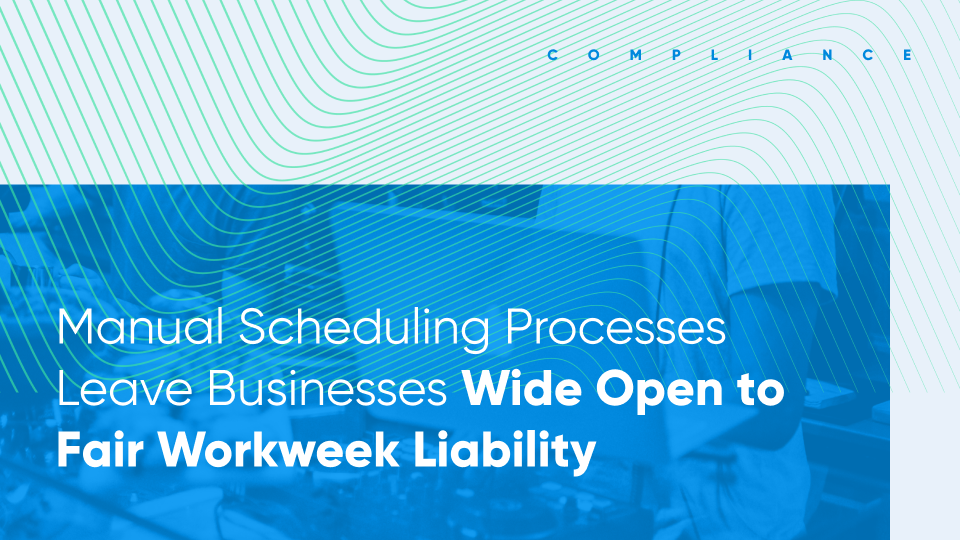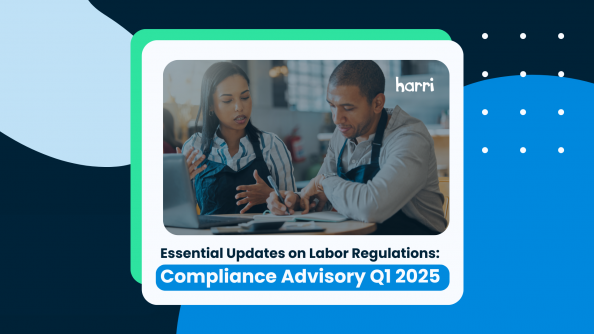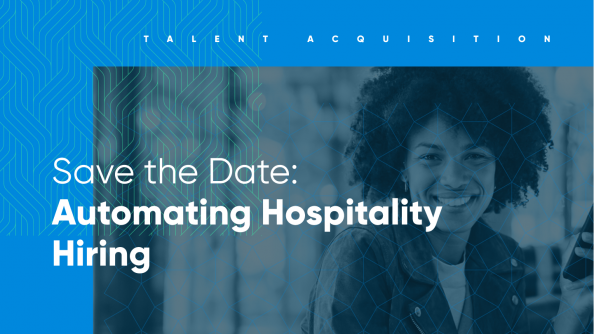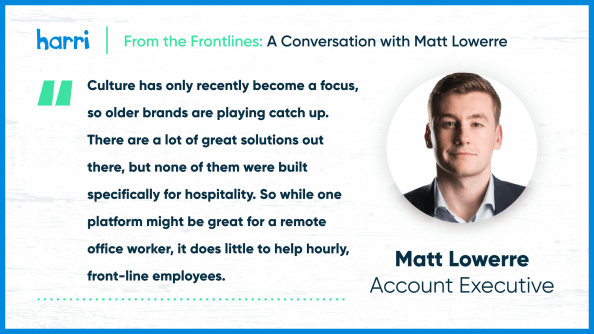Manual Scheduling Processes Leave Businesses Wide Open to Fair Workweek Liability

- By Harri Insider Team | June 4, 2021
Fair Workweek labor laws are spreading across the country, with multi-million dollar lawsuits increasing as state governments focus on quality of life improvements for service-level workers. Hospitality businesses that haven’t already begun preparing for compliance are at serious risk for extreme financial and operational disruptions.
To start, what is Fair Workweek?
Fair Workweek is a set of predictive scheduling laws designed to create a more stable working environment for hourly workers.
Operational requirements for Fair Workweek include:
- Issuing employee schedules 10-14 days in advance
- Paying affected employees for making changes to posted schedules
- Creating good faith estimates of expected employee hours and shifts
- Giving employees 8-10 hours of rest between shifts
- Offering open shifts to existing employees before hiring new staff
The rules vary based on your exact city or state, but these “predictive scheduling” laws focus on exactly that — the employee schedule.
Although these laws are very well intended, they make scheduling incredibly difficult (and expensive). Not compliance promises even heftier fees. But when a hospitality business’ ability to operate and meet customer demand is entirely dependent on team schedules, complying with these restrictive laws can prove extremely difficult.
Today, we’re unpacking why hospitality brands cannot successfully navigate Fair Workweek using manual scheduling practices, and how an intelligent scheduling platform ensures fully compliant labor-efficient operations.
Racking up premium payments with manual scheduling
Your managers are incredibly busy. From managing employee and store operations to ensuring great customer service, keeping up with ever-changing labor laws like Fair Workweek is a huge challenge.
Asking managers to manually oversee scheduling for hourly workers leaves you wide open for compliance violations.
Store managers shouldn’t be legal experts
Building labor efficiency schedules in a constantly moving hospitality is no easy feat. Throwing Fair Workweek requirements into the mix, which are tough to swallow even for legal professionals, adds an entirely new layer of complexity.
What are the state-wide requirements? Are there city-wide requirements? How do Fair Workweek requirements stack up against other wage and labor laws? A schedule needs to be adjusted, is there a way to make a change that won’t incur a penalty payment?
Answering these and other questions (and trust us, there will be others) is a full-time job on top of day-to-day management duties.
And while some brands opt to hire legal consultants, it’s still up to managers to put those compliance rules into place and strategize how to navigate schedule changes when they occur.
Businesses pay unnecessary premiums
Because tracking Fair Workweek premium conditions is extremely difficult, managers often pay premium scheduling payments even when it’s not required. It’s not uncommon for brands to “proactively” pay employees premiums when they’re unsure of premium payment eligibility to avoid violation lawsuits. Not only is this unscalable but it’s so inconsistent that it’s begging for a non-compliance audit.
For example, say an employee is proactively paid a premium pay for working a last-minute extended shift. If the shift was only extended by 10 minutes, they didn’t need to be paid a premium, but the manager decided to pay it anyway to avoid a potential violation — they didn’t have time to check the law and you needed the manpower.
A few weeks later, that employee is unexpectedly asked to stay past their shift for an extra 10 minutes. Because they were paid a premium the first time around, they (understandably think they’re entitled to a payment for a 10-minute shift extension. They don’t receive the payment and complain to your local compliance office.
Boom. Suddenly you’re neck-deep in a Fair Workweek audit that costs time, money, and might identify other violations you were previously unaware of…even though you weren’t in the wrong to begin with.
Premium payments will escalate out of control
TTacking premium payments, whether they’re properly earned or paid proactively, is incredibly difficult when you’re managing multiple stores and hundreds of employees. While a compliance-driven scheduling platform will automatically track all payments for you, manually logging these is nearly impossible — and prone to errors.
There are two huge downsides to this. One, you won’t have an accurate picture of labor spend. Small premium payments add up quickly, and you must understand who you’re paying and when to optimize your labor strategies.
The second point returns back to compliance audits. If your hospitality business undergoes a Fair Workweek compliance audit, you must produce a record of all premiums paid over an extended period of time. Failure to provide documentation of each and every premium payment will result in a non-compliance fine.
Hospitality brands must take a tech-based solution to manage Fair Workweek. Your current manual scheduling processes might be working now, but it’s likely that they’re extremely unoptimized and time-consuming for your busy managers — both of which are solved for by a predictive scheduling platform.
Gone are the days where managers must memorize every Fair Workweek subcategory, try to decipher crossed-out paper schedules, or track every premium payment by hand.
Intelligent scheduling technology empowers managers to make smarter scheduling decisions that keep costs low without sacrificing customer service — and while staying fully compliant with wage and labor laws.
We built Harri’s intelligent scheduling tools specifically with Fair Workweek compliance in mind. By automatically factoring localized wage and labor laws into employee schedules, Harri streamlines Fair Workweek navigation and reporting.
See how Harri empowers restaurant operators to focus on what they do best: creating a great guest experience.
Demand-based scheduling to minimize premiums
One of the hardest parts of Fair Workweek is staying labor efficient while following strict scheduling laws. Hospitality is wildly unpredictable, which means that even the most well-thought-out schedule can see dramatic changes in response to customer demand.
Harri’s compliance-driven scheduling integrates historic sales data to easily create highly effective, data-backed schedules that speak to predicted customer demand. Why is this important for Fair Workweek premiums?
While you undoubtedly have a good idea of your restaurant’s busy times and lull periods, Harri’s intelligent scheduling platform accounts for a variety of factors that could affect your labor distribution. This includes day, time, holiday, holiday AND day, weather, location, and more. So if a snowy Wednesday night New Year’s Eve historically saw around the same customer traffic as a clear-skied Friday night New Year’s Eve, you can plan your labor accordingly.
And when your labor distribution is thoughtfully planned, you’re much less likely to need to call employees in last-minute, or worse, send them home early — both of which will incur premium payments.
Non-compliance alerts for premium payments
As your partners in compliance, our goal is to take the legal burdens out of Fair Workweek so you can run smooth, successful restaurant operations.
If a manager is creating an employee schedule that would violate Fair Workweek or cause a premium payment, such as scheduling an employee for a clopening, making a last-minute schedule change, or forgetting to provide advanced notice schedules, Harri will alert managers that they’re at risk of breaking compliance.
A full list of Fair Workweek alerts includes:
- Right to rest schedule violations
- Warnings if an advanced notice schedule posting is due
- Changes made to posted schedules
- Manager confirmations for employee-driven shift swaps
- Updates or renewals for good faith estimates
Not only does this prevent costly mistakes and escalating premium payments, but it helps managers decide when paying the premium is worth the extra cost. Because Harri’s scheduling platform integrates with your payroll processor, it also means that employees will never be paid premiums they don’t deserve.
Audit Fair Workweek premium payments
One of the biggest disadvantages to manual scheduling is that you don’t have access to a real-time, centralized view of all employee premium payments. This prevents your team from getting an accurate gauge on labor spend and creates an enormous administrative project if/when you need to pull premium payment records during a compliance audit.
Harri creates a digital paper trail of Fair Workweek payments that can be viewed, downloaded, and sent from any device.
Every time a Fair Workweek premium payment is paid, Harri automatically stores a record of:
- All employee historic schedules
- Changes made to employee schedules, when and why
- Which employee the payment went to
- How much was paid
- When it was paid
- The reason(s) for the premium payment
- The manager that approved the premium payment
Imagine trying to retrieve all of this information for every single employee over the course of 2 or 3 years? The time-savings associated with Harri’s compliance platform completely outshines manual or fragmented Fair Workweek tracking.
It’s time to ditch manual scheduling
Hospitality operators seeking to reduce scheduling costs, create more labor efficient schedules, and reduce Fair Workweek-induced premium payments need to integrate an all-in-one HCM platform into day-to-day operators.
Not all HCM platforms are created equal, however. Look for a solution built to manage the specific nuances of hospitality labor compliance and Fair Workweek, like Harri, to protect your business from costly non-compliance lawsuits. Want to learn more? See how Harri keeps major hospitality brands compliant with Fair Workweek.




















